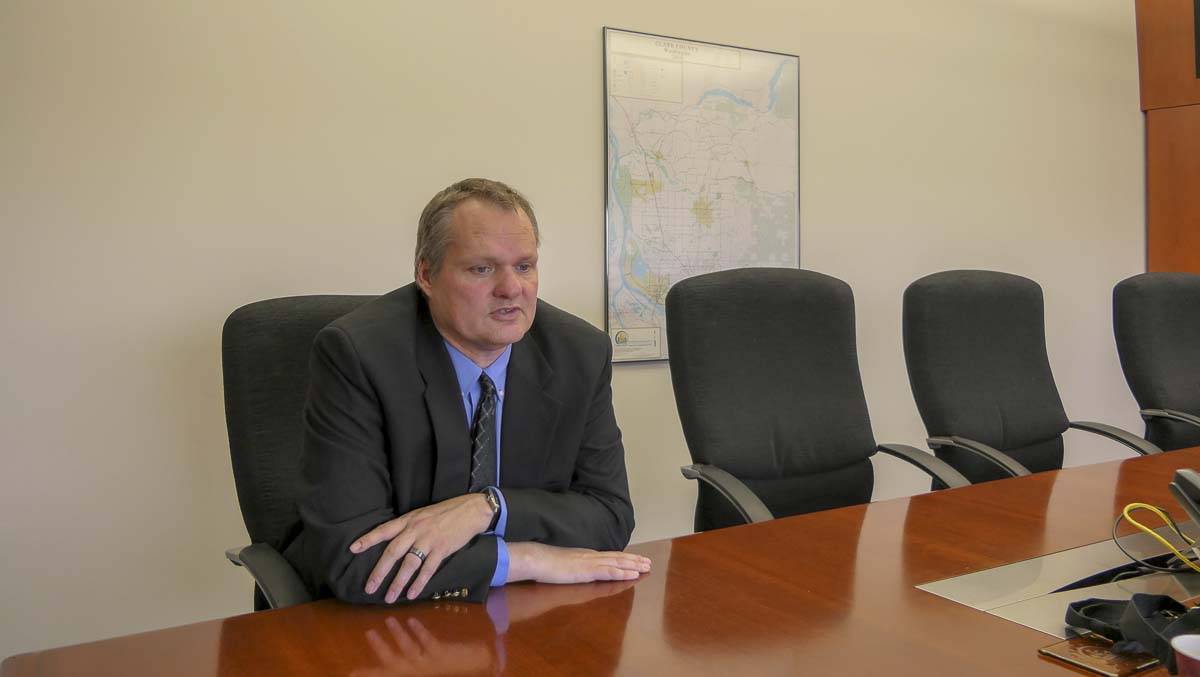Shawn Henessee admits tensions are higher as he completes deep dives into the budgets of every department
CLARK COUNTY — UPDATE – 5/24/19: At a work session this week to go over the Spring supplemental budget requests, Henessee said his budget deep-dives so far have realized $834,000 in savings for this year, $362,000 of which will be ongoing savings.
“We’re not complete yet with all of the budget deep dives so we may be able to realize some additional savings,” Henessee told the council.
The county manager has also been working to restructure county departments, such as moving the medical examiner under the Public Health Department and eliminating the General Services Department. Henessee says that amounted to $32,000 in one-time savings and $116,000 in ongoing savings.
“It’s not a large amount of money, but again that’s ongoing savings, which help,” says Henessee. “The major benefit is to restructure some of the departments to get more support for them.”
The Spring supplemental budget is due for a full public hearing before the County Council on June 4, but a list of recommended budget adjustments is available here.
ORIGINAL STORY:
Anyone who’s ever worked somewhere that had a change in leadership knows the tension it can cause. A new manager usually wants to get to know their employees and flip through budgets to see how things are being run.

When Shawn Henessee took over as Clark County manager last August, he landed smack in the middle of the 2019 budget process. He has said it was something like trying to get a sip from the business end of a firehose, and the work kept him at the office for long hours right up until the final day of the year.
Since then, Henessee says he has been slowly working his way through deep dives into each department’s budgets and operations, trying to understand how they are being run, and whether there are cost savings that can be realized.
“It’s not going to fix our budgetary problems,” Henessee says. “I’ve never tried to portray it that way. It will realize savings and any amount of savings helps.”

The deep dives, Henessee says, are partly meant to streamline departmental budgets, but also to help him better understand the story of each department.
“Am I here to save money and to find reductions? Absolutely. But the number one thing for me is just to educate myself,” he says. “I need to understand more about you, your department, your budget, where you’re at, where you anticipate going with your levels of service.”
The process involves talking with department directors and managers, along with an in-depth look through their budgets. Henessee says the scrutiny has made some people a little uncomfortable.
“Candidly, I don’t think most departments have been used to that,” he says. “I think it caused a lot of consternation amongst people, to go into that level in the budget. I was a little surprised, and I would say even shocked, by the fact that people hadn’t really gone into their budget in that detail.”
Right now, Henessee won’t say what cost savings have been realized from his deep dives. He hopes to have a presentation for the County Council sometime in the next couple of months.
“These are really to realize changes in the 2020 budget, although I am realizing savings in the 2019 budget at the same time.”
The county is in the process of switching to a new cloud-based time and financial management software known as Workday. The implementation has, at times, been rough and frustrating, but Henessee says he’s optimistic the investment will be worth it. The next step later this year will be implementing new departmental budgeting software, which Henessee hopes will make it easier to see exactly where money is being spent in real time.
In addition to that change, Henessee hopes to change some of the habits that have been formed in how the county departments deal with their budgets.
“I’m still concerned about the way we budget some things here, particularly our use of contingency,” says the former mid-westerner. “I’m used to using contingency as a line item that is for ‘unanticipated things.’ We use contingency for things that we know we’re gonna have costs coming up, and to me that is not a contingency … Contingency is ‘the hot water tank blew up in the middle of the night.’ That’s what you use contingency for.”
Henessee is also not a fan of supplemental budgets — the practice of departments requesting additional funds usually in the Spring and Winter to deal with unexpected expenditures. His hope is the deep dives and new budgeting software will help departments find extra money through internal cost savings, rather than additional spending from the general fund.
“If they’ve had open positions for quite a while and they haven’t filled them, first question I always ask is obviously it must not be that critical a position if it’s been open for this long,” Henessee says.
One thing the county manager would very much like to avoid is across-the-board budget cuts, something he frequently expresses distaste for.
“It sounds politically attractive and things like that, and if you have to do it, you have to do it,” Henessee says, “but it also, in my opinion, penalizes departments that have been very frugal with their budget because they’re taking as big of a hit as somebody who’s been rather profligate in their expenditures and haven’t made any effort.”
Despite the frayed nerves in many county departments, Henessee’s hope is that his directors ultimately see the deep dives and face-to-face meetings as a positive in the long run.
“It helps me to really see the story of that department,” he says. “You can really see in some departments that, as somebody who used to oversee a number of large county departments that had basically no capital costs, all your budget is in personnel costs, and that’s the largest percentage of Clark County’s cost by far.”
And “personnel” really means “people,” something Henessee says he’s aware of. The county is operating with fewer employees, overall, than they did before the Great Recession. But the cost of employing those people has continued to go up, meaning the percentage of the county budget assigned to personnel has gone up, even as the number of employees has stayed relatively level. In addition to that, Henessee has a long list of state-mandated services that he must find a way to pay for, or risk being out of compliance.
“The state does love to mandate services that we have to pay for,” he says dryly.
This year marks a switch back to annual budgets for Clark County, after a brief trial with biennial budgeting. Despite the extra work that puts on his plate, Henessee believes the yearly budget process will allow them more flexibility and mobility when it comes to responding to changes in the economic climate.
“I’m still held prisoner to macro-economic trends,” he says. “I live in fear of a significant economic downturn because it’s going to have a very significant impact, again, on Clark County.”
And if shaking a few trees means a little more money in the general fund or departmental budgets, Henessee feels that’s a small price to pay for a little hedge against the next, inevitable, economic hiccup.




